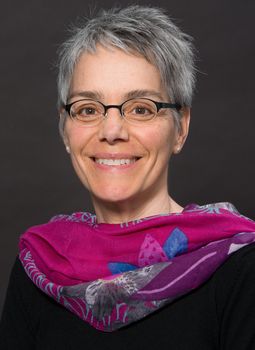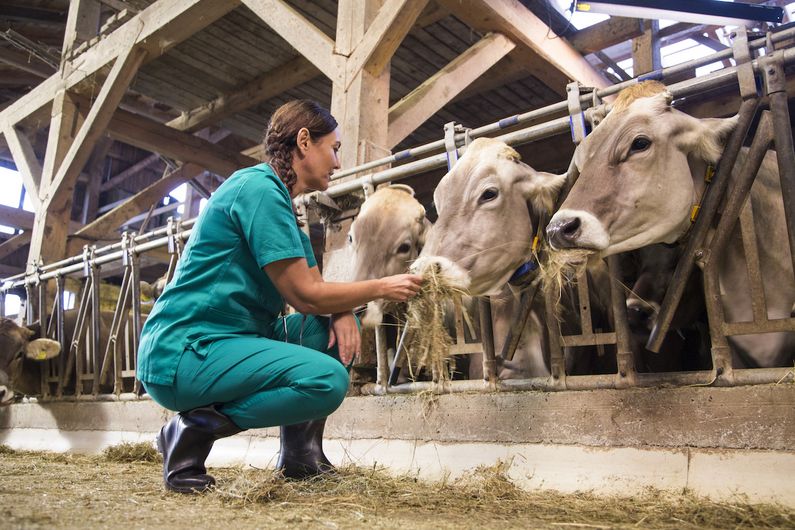Getting a doctorate in ‘decentralized’ veterinary medicine
- UdeMNouvelles
09/03/2020
- Forum
There’s a shortage of veterinary doctors in several regions of Quebec. Could a new graduate training program in Rimouski encourage more young vets to practice outside major cities?

Christine Theoret
Dr. Christine Theoret had finished helping her daughter move to Chicoutimi, in Quebec’s Saguenay-Lac-Saint-Jean region, to begin studies in a ‘decentralized’ physiotherapy program run by McGill University, and was driving home when she had an idea.
Université de Montréal, she thought, should have just such a program for its graduate students in veterinary medicine. And now, in collaboration with the Université du Québec à Rimouski, her idea is a step closer to becoming a reality in the Lower St. Lawrence.
Today the Quebec government announced funding of $627,946 for a feasibility study into the project. Professor Theoret, the faculty’s dean, explains what’s ahead.
How will the project of a ‘decentralized’ doctoral program in veterinary medicine in Rimouski address the shortage of veterinary doctors in the regions?
Before I began my mandate as dean in June 2018, there was already talk of increasing the size of student cohorts to address the shortage of veterinarians in the regions. Still, I thought more needed to be done, and the decentralized training model seemed to me to be a good solution. In fact, UdeM has had great success with its delocalized medicine program, created some 15 years ago with Université du Québec à Trois-Rivières. The American Veterinary Medical Association, from which our faculty receives its accreditation, has also confirmed to me that there are offshore programs in veterinary medicine in the United States. It was therefore possible to do something similar here. With the support of our rector at the time, Guy Breton, I asked Professor Jean Sirois, a former dean of our faculty, to help me put together a proposal for a feasibility study to present to the government.
Is the lack of newly graduated veterinarians in the regions a major concern?
For 2018-2019 the MAPAQ, Quebec’s Ministry of Agriculture, Fisheries and Food, produced a report on veterinary services in the province’s bio-food sector. It looked at various sub-sectors — avian, bovine, caprine, ovine and porcine — and revealed that a large number of veterinarians working with farm animals have more than 30 years’ experience, with very few new graduates choosing this type of practice. As well, the Canadian Veterinary Medical Association recently studied the veterinary workforce in Canada — in particular, the relationship between supply and demand for veterinary services. The results of this study confirm a general consensus that there is a shortage of veterinarians in Canada and that, among all Canadian provinces, Quebec is the most affected. The issue of renewing the corps of doctors is therefore present throughout the profession, particularly for those working with farm animals but also for those who work with pets.
Why is relocating a program such an effective strategy in countering the shortage in the regions?
I asked Raymond Lalande, who was vice-dean of UdeM’s Faculty of Medicine when its program was relocated to UQTR, that question. He explained to me that its success was the sum of several factors. In particular, there is the fact that students are exposed to the regions during their studies, so they see the attraction of relocating there. And if a person studies in a region, he or she may meet their future spouse there and decide to stay on after they graduate.
Why did you choose to partner with UQAR?
First of all, because the Lower St. Lawrence is a region the MAPAQ has designated as ‘fragile’ in terms of renewing its corps of veterinarians. Secondly, we wanted to partner with a university that has good relations with UdeM. We also needed a region that has enough veterinarians to receive students on internships. Finally, the Lower St. Lawrence has several other institutions of interest, such as the Cégep de La Pocatière with its program in animal-health techniques, and the MAPAQ’s Institut de technologie agroalimentaire, also in La Pocatière. And in Mont-Joli there’s the Maurice Lamontagne Research Institute, which specializes in ocean sciences and aquatic ecosystem management, both of interest to our researchers. UQAR also has extensive expertise in marine biology and terrestrial fauna of the Far North. All this will allow us to develop new elective courses in our veterinary medicine program and open up new possibilities of collaborations for our researchers.
How will the training work?
The first three years will take place in Rimouski with a good number of courses given in class by UQAR faculty as well as by UdeM faculty who will choose to go there. Other courses will be given online — we’ve had a lot of practice doing so lately, because of the Covid-19 pandemic. There is always a good deal of online interaction going on between groups of students anyway, and teamwork will be developed between the two locations, in Sainte-Hyacinthe and Rimouski. Activities are also planned to allow the two cohorts to meet in person, so when students from Rimouski arrive in Saint-Hyacinthe in their fourth year to use our clinical infrastructure, they will already have established solid links with their collagues of the same class. The fifth year will be spent doing clinical internships, at least half of which will be with veterinary doctors in regions identified by the MAPAQ as fragile, namely the Lower St. Lawrence, Saguenay-Lac-Saint-Jean, Abitibi-Témiscamingue, Gaspé-Magdalen-Islands, Outaouais and North Shore.
When do you hope the program will start?
We’ll submit our feasibility study to the government this fall, and will see what kind of a reception it gets. We’re optimistic, though, because so far the study looks good. Before the pandemic hit, we thought we could start our first cohort in the fall of 2022, but given the context it’s still up in the air just how fast we can move ahead.










